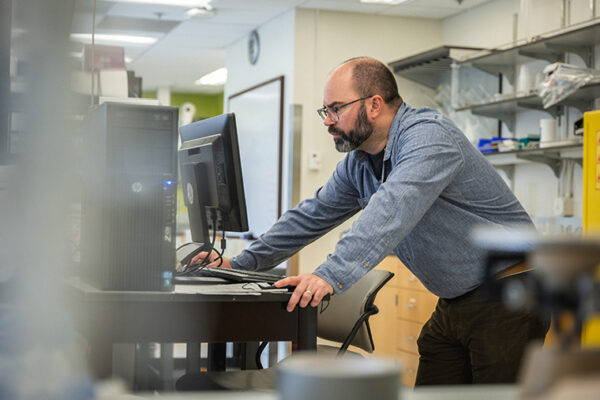When more complex is simpler
A new modeling framework proposed by physicist Mikhail Tikhonov in Arts & Sciences demonstrates how a more complex microbial ecosystem can be more coarse-grainable, making it potentially easier for scientists to understand, than one with only a few microbes interacting.
Undergraduate biologists awarded 2022 Quatrano, Spector prizes
Ethan Lowder, a December 2021 graduate who majored in the biochemistry track of biology in Arts & Sciences, won the Ralph S. Quatrano Prize; Kayla Wallace, a senior majoring in environmental biology with a minor in anthropology in Arts & Sciences, received the Spector Prize.
Nonlethal parasites reduce how much their wild hosts eat, leading to ecosystem effects
Research from the Living Earth Collaborative highlights the cascading consequences of common parasitic infections. Although many of these infections are not lethal, they can still impact health or animal behavior, leading hosts to eat less vegetation. The study led by biologist Amanda Koltz in Arts & Sciences is published in the Proceedings of the National Academy of Sciences.
Pappu lab untangles more IDR secrets
Rohit Pappu’s latest look at intrinsically disordered regions of proteins explains why some sequences behave in different ways. His paper was published in the Proceedings of the National Academy of Sciences.
Class Acts: Gabriella Smith
Gabriella Smith, a senior biology major in Arts & Sciences at Washington University in St. Louis, is a champion for access to mental health services. She hopes to combine her passion for working with children with her leadership skills to pursue a career in medicine that incorporates patient care, research and advocacy.
Bersi wins American Heart Association Career Development Award
Matthew Bersi, assistant professor at the McKelvey School of Engineering, will use tools from engineering and biology to investigate blood vessel stiffening from high blood pressure with a three-year $231,000 Career Development Award from the American Heart Association.
Jez installed as Spencer T. Olin Professor of Biology
Joseph Jez was installed as the Spencer T. Olin Professor of Biology in Arts & Sciences during a ceremony April 4 in Holmes Lounge. He gave an installation lecture, “Exploring Nature’s Machinery.”
Canid conservation program launched
Washington University in St. Louis and the Living Earth Collaborative are part of a new Missouri-based conservation initiative led by the Saint Louis Zoo. Working with the Endangered Wolf Center, scientists are looking to answer ecological and health-related questions about canids — red foxes, gray foxes and coyotes — as well as bobcats, which live in close association with canids.
Brains and brawn helped crows and ravens take over the world
Crows and ravens have great flying ability, which allows them to gain access to new places more easily. While their flying skills were key to their success, new research from biologists in Arts & Sciences also shows that big bodies and big brains played an important role in helping crows and ravens survive in the new climates they occupied.
From rare soil microbe, a new antibiotic candidate
Demand for new kinds of antibiotics is surging, as drug-resistant and emerging infections are becoming an increasingly serious global health threat. Biologist Joshua Blodgett in Arts & Sciences discovered a new candidate for drug development from bioactive compounds in a soil bacterium. The findings are reported in the Proceedings of the National Academy of Sciences.
Older Stories









